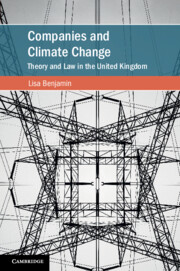Book contents
- Companies and Climate Change
- Cambridge Studies on Environment, Energy and Natural Resources Governance
- Companies and Climate Change
- Copyright page
- Dedication
- Contents
- Acknowledgements
- 1 Introduction
- 2 Theorising the Company in the Context of Climate Change
- 3 English Company Law and Climate Change
- 4 International and Transnational Climate Change Law and Policies
- 5 Domestic Climate and Energy Regulation
- 6 Companies, Human Rights and Climate Litigation
- 7 Fiscal Barriers and Incentives to Corporate Climate Action
- 8 Conclusion
- Index
6 - Companies, Human Rights and Climate Litigation
Published online by Cambridge University Press: 09 April 2021
- Companies and Climate Change
- Cambridge Studies on Environment, Energy and Natural Resources Governance
- Companies and Climate Change
- Copyright page
- Dedication
- Contents
- Acknowledgements
- 1 Introduction
- 2 Theorising the Company in the Context of Climate Change
- 3 English Company Law and Climate Change
- 4 International and Transnational Climate Change Law and Policies
- 5 Domestic Climate and Energy Regulation
- 6 Companies, Human Rights and Climate Litigation
- 7 Fiscal Barriers and Incentives to Corporate Climate Action
- 8 Conclusion
- Index
Summary
The chapter opens with the historic decision by the Philippines Human Rights Commission that carbon-major companies can be liable for climate-induced harms. While this decision has no direct legal impact on companies, it illustrates the ever closer connection between human rights and climate impacts. The chapter assesses the transnational business and human rights landscape, primarily through an assessment of the UN Guiding Principles on Business and Human Rights and illustrated by a recent dispute mediated by the Dutch National Contact Point under the OECD Guidelines on the climate impacts of ING’s lending practices. It charts the two waves of climate-based litigation against states and companies, with a focus on cases in the United States, The Netherlands, and Pakistan and two recent UK cases. The chapter provides an assessment of the direct overlap between human rights and climate litigation with the RWE v Lliuya case and the Philippines Human Rights Commission’s investigation of carbon-majors. The chapter closes with a look at the potential crystallisation of corporate climate obligations in the future through the Principles of Climate Obligations of Enterprises and the barrier that separate legal personality poses within corporate groups to the success of climate litigation efforts.
- Type
- Chapter
- Information
- Companies and Climate ChangeTheory and Law in the United Kingdom, pp. 141 - 172Publisher: Cambridge University PressPrint publication year: 2021

